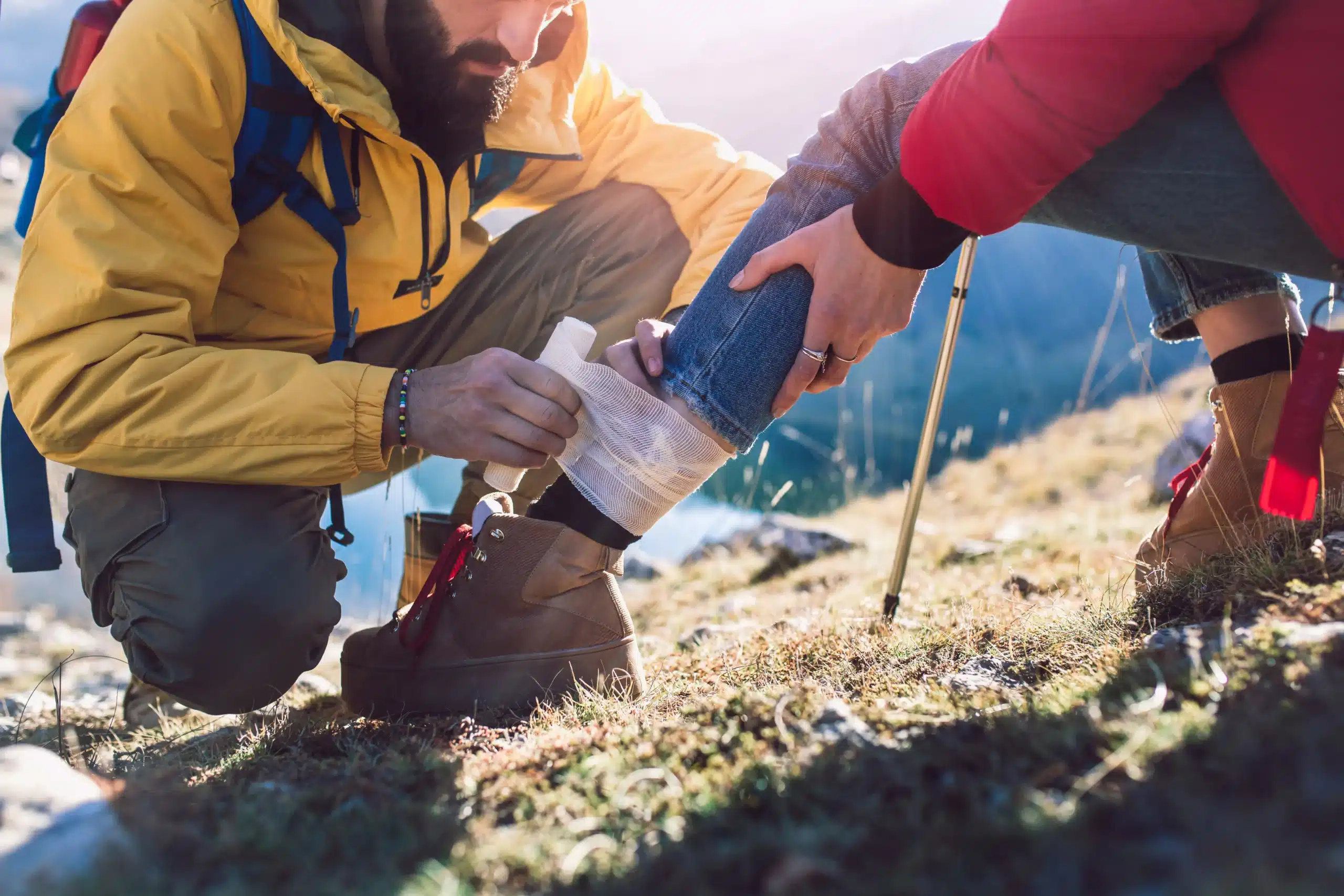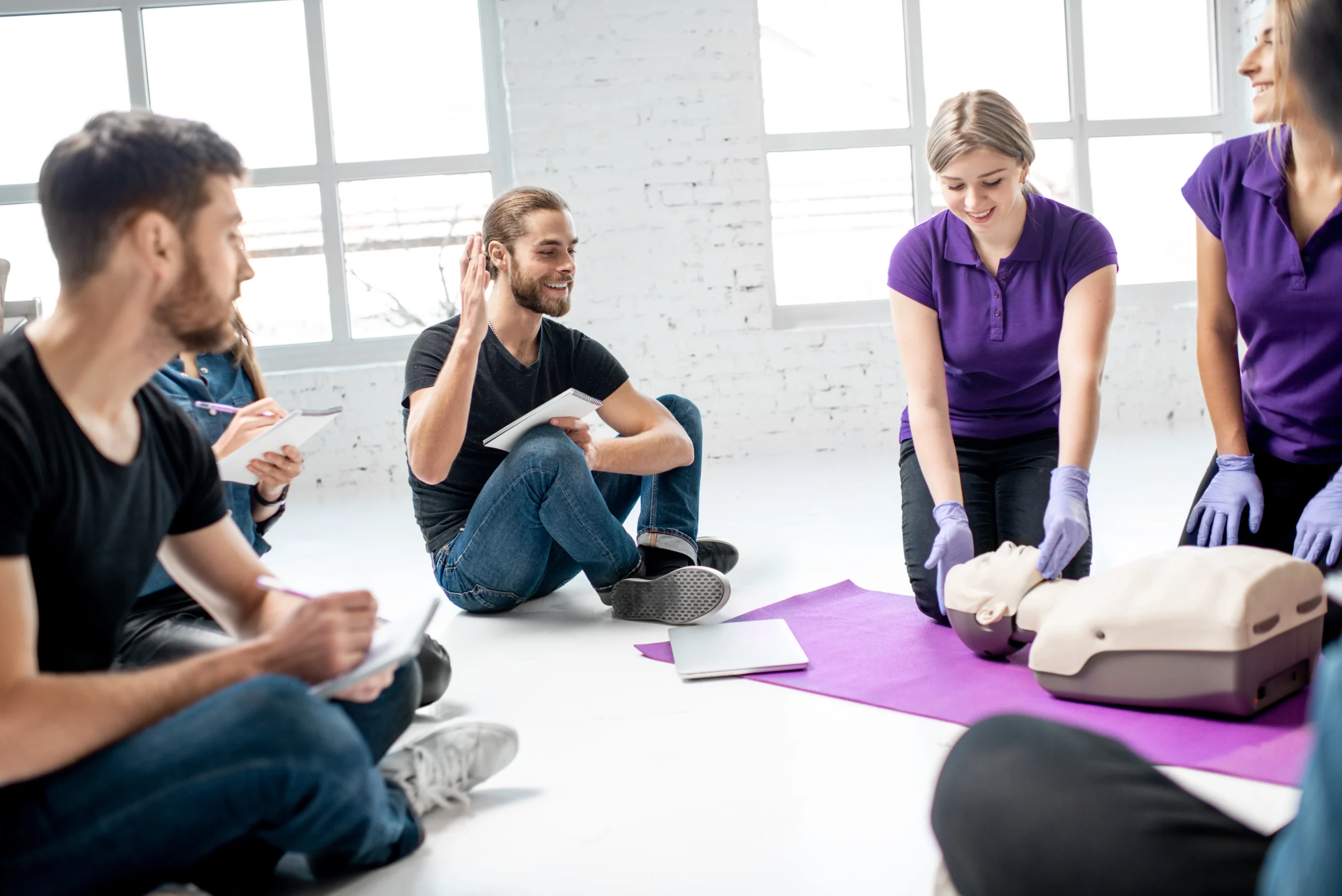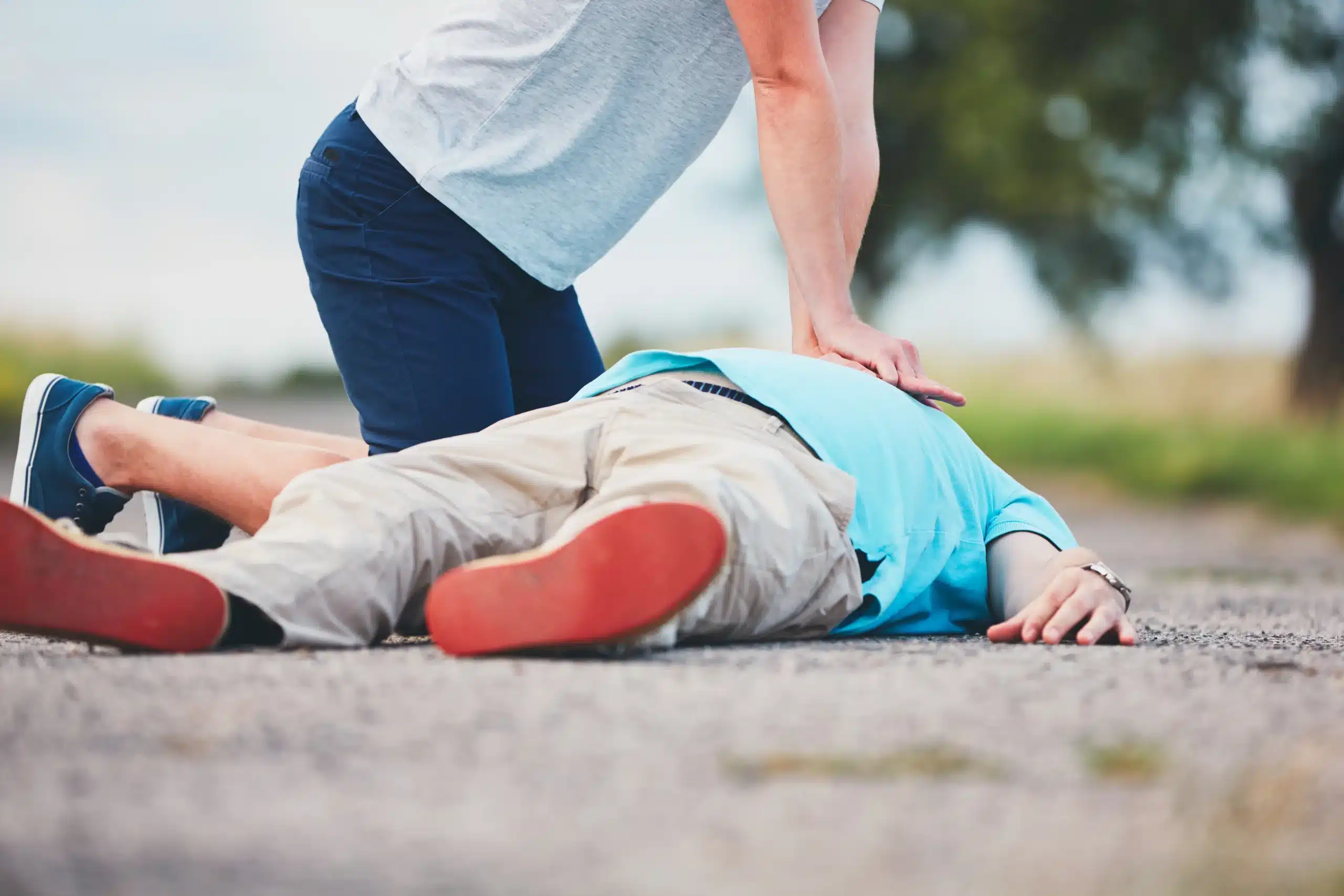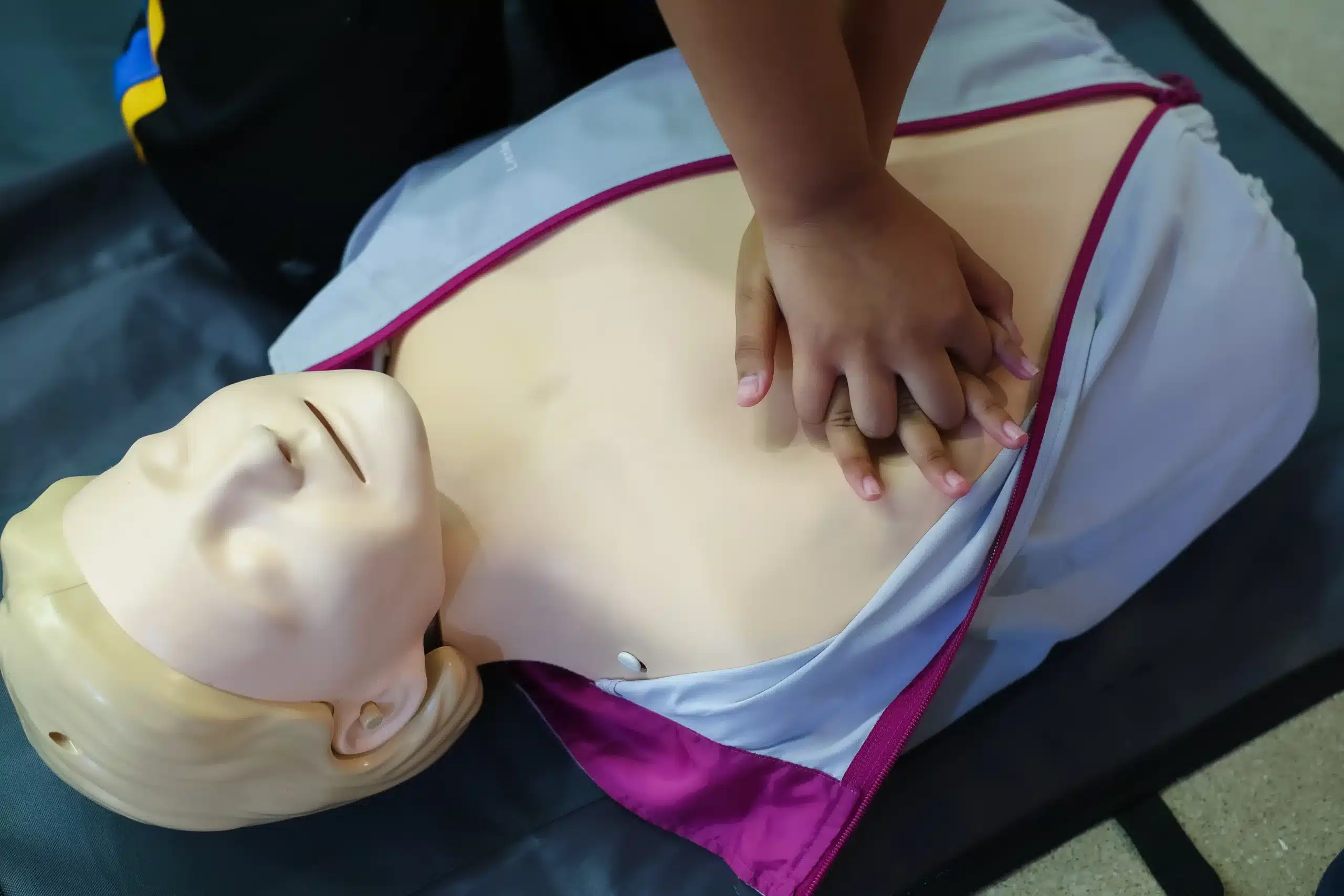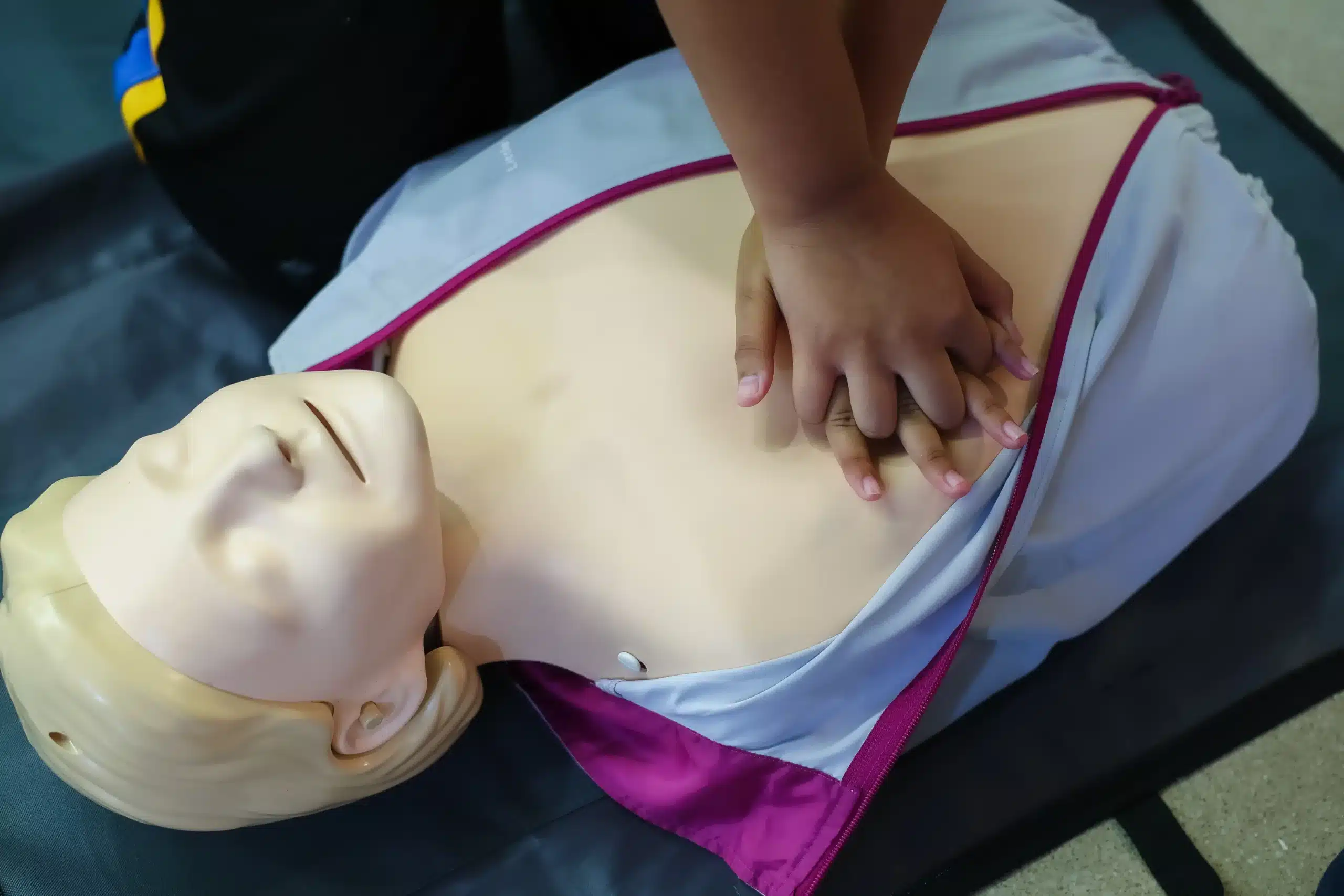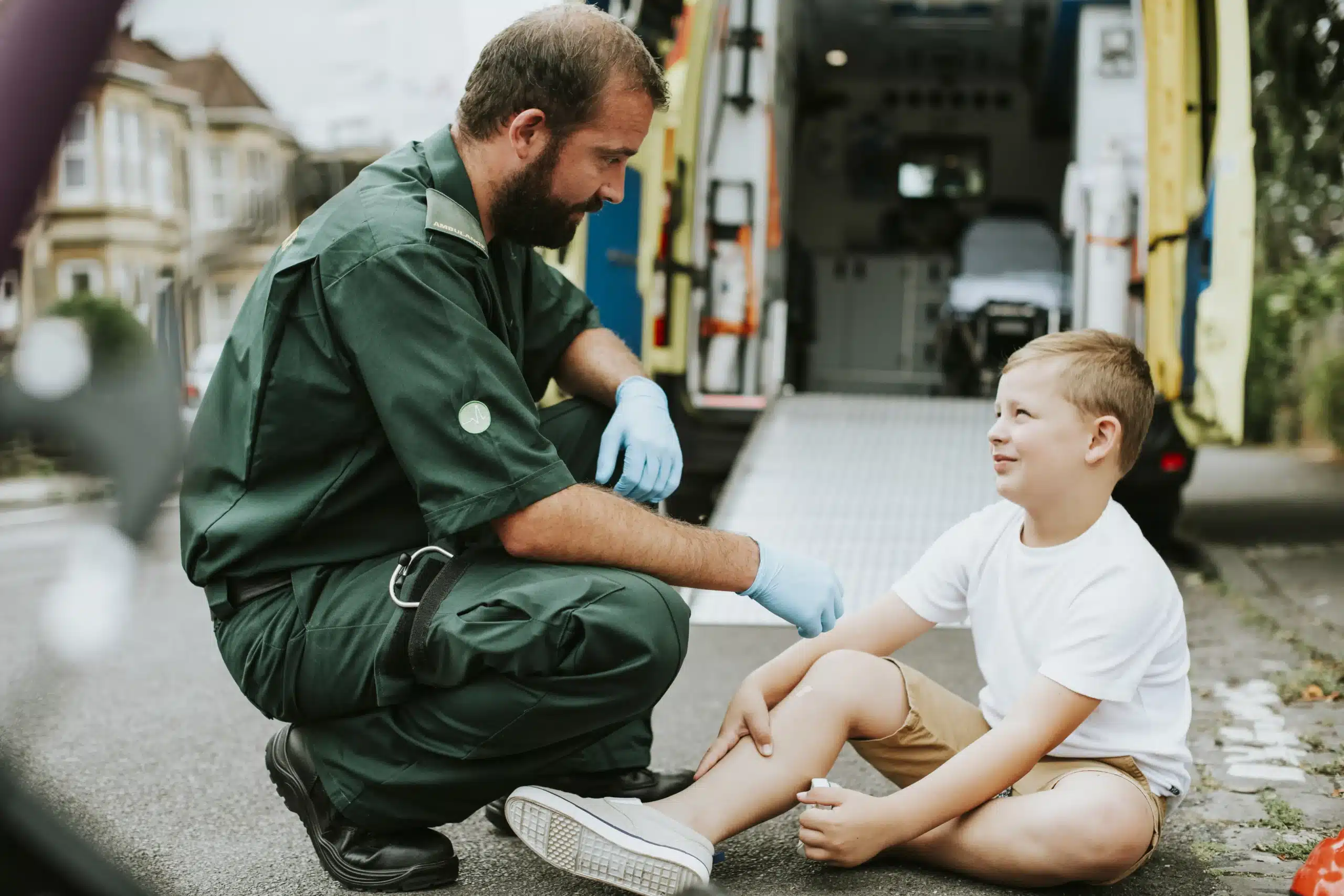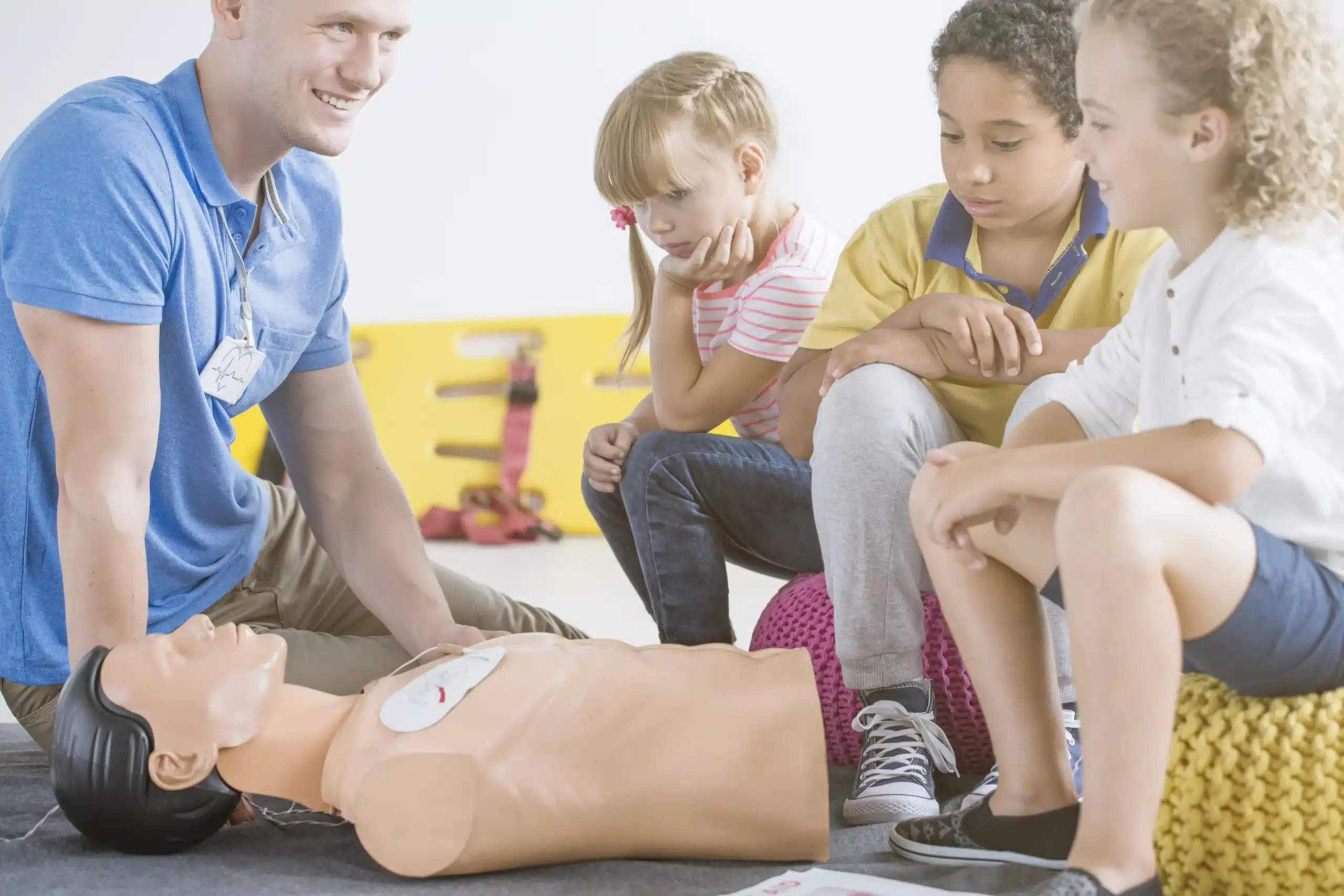Emergencies can happen anytime, anywhere. Would you know what to do if someone near you suddenly collapsed from cardiac arrest? CPR certification in Novato provides the skills and confidence to respond effectively in such critical situations. This guide breaks down the essentials of CPR certification in Novato, covering various aspects, including course types, costs, and how to choose the right class for your needs. We’ll also address common misconceptions about CPR and explore the benefits of both online and in-person training options. Whether you’re seeking certification for personal or professional reasons, this guide will help you find the perfect CPR class in Novato.
Key Takeaways
- CPR certification is accessible and affordable in Novato: Many providers offer various courses and flexible scheduling to fit your needs and budget. Consider learning CPR even if it’s not required for your job.
- Choose the right CPR class: Whether you’re a healthcare provider, work in childcare, or want personal knowledge, select a course based on its content, accreditation (AHA certification is a good indicator), schedule, and your preferred learning style (online, in-person, or hybrid).
- Stay current with your CPR skills: Recertify every two years and practice regularly. Even without formal certification, remember that hands-on CPR can still make a difference in a crisis.
What is CPR Certification in Novato?
This section explains CPR and addresses common training misconceptions.
What is CPR and Why is it Important?
CPR stands for cardiopulmonary resuscitation. It’s a lifesaving technique used when someone’s heart stops beating. CPR involves chest compressions and rescue breaths to keep oxygenated blood flowing to the brain and other vital organs until professional medical help arrives. Learning CPR can double a person’s chance of survival after cardiac arrest, as highlighted by the British Heart Foundation. For those in healthcare or related studies, BLS certification is often required. Even if not required for your job, knowing CPR equips you to help loved ones, colleagues, or even strangers during emergencies.
Common CPR Training Misconceptions
One misconception is that you need certification to perform CPR. While we strongly recommend getting certified for comprehensive training, anyone can perform hands-only CPR. Don’t let the absence of a certificate prevent you from helping someone in need. Another myth is that only medical professionals can do CPR effectively. The American Heart Association now prioritizes compression-only CPR in most cases, simplifying the process for everyone. Concerns about incorrect technique, causing injury, or giving rescue breaths sometimes discourage people from learning CPR, as noted by Emergency First Response. Dispelling these misconceptions is vital, as they can deter individuals from intervening during life-threatening situations. Remember, any attempt at CPR is better than no attempt.
CPR Classes in Novato
CPR classes in Novato offer various certifications to meet different needs, from basic life support skills to specialized pediatric training. Whether you’re a healthcare provider, a parent, or someone who wants to be prepared, you can find a suitable course.
Adult, Child, and Infant CPR
Providers like CPR Marin offer comprehensive CPR training that covers adult, child, and infant CPR techniques. These courses teach you how to assess a victim, perform chest compressions, and give rescue breaths, preparing you to respond to emergencies involving people of all ages.
BLS for Healthcare Providers
Healthcare professionals and students often need Basic Life Support (BLS) certification. BLS training includes core CPR skills, AED use, and two-rescuer CPR—essential skills for anyone working in healthcare.
First Aid Courses
First Aid certification often complements CPR training. Combined First Aid and CPR/AED classes in Novato meet OSHA requirements and are valid for two years. These courses cover injury management, bleeding control, and other essential first aid skills.
Specialized Training
Novato also offers specialized training beyond general CPR and First Aid. Childcare providers, for instance, can attend Pediatric CPR and First Aid courses tailored to the needs of infants and children. These specialized courses offer focused knowledge and skills for specific professions and situations.
CPR Certification Costs in Novato
Knowing the cost of CPR certification is a practical first step. Let’s break down what you can expect to pay for CPR training in Novato.
Course Prices
CPR and First Aid courses in Novato generally cost around $64 per person. Looking to get certified with a friend or family member? Couple rates are often available for around $125, offering a slight discount. These prices make acquiring these vital life-saving skills accessible. You can compare these rates with other providers like CPR Marin to get a sense of local pricing.
Group and Couple Discounts
If you’re coordinating training for your workplace, a community group, or even a large family, group discounts can significantly reduce the cost. Organizing a class for five or more people often unlocks substantial savings. Sometimes, if your group is large enough, your own certification might even be free. Safety Training Seminars offers group discounts, making it a cost-effective choice for larger groups.
Value for Your Money
Beyond the initial cost, think about the overall value when selecting a CPR certification course. Safety Training Seminars provides a variety of American Heart Association (AHA) certified courses, including CPR, BLS, ACLS, PALS, and First Aid—all with a low-price guarantee. With classes offered daily, including weekends, finding a convenient time that fits your budget is straightforward. This flexibility and commitment to affordability makes prioritizing this essential training much easier.
Choose the Right CPR Class
Finding the right CPR class involves considering your schedule, the course content, and your specific needs. Let’s break down how to make the best choice for you.
Assess Your Schedule and Preferences
CPR classes in Novato offer flexibility to accommodate various schedules and learning preferences. Think about what works best for you. Do you prefer weekday evenings, weekends, or maybe even a condensed one-day course? Some providers offer last-minute registration, which can be helpful if you need certification quickly. Consider whether you learn best in a traditional classroom setting or if a blended learning approach with online modules and in-person skills practice would be a better fit. Check with providers like CPR Marin to see their scheduling options.
Evaluate Course Content and Accreditation
Not all CPR certifications are created equal. Choose a course accredited by a reputable organization like the American Heart Association (AHA). Safety Training Seminars offers AHA-certified courses in CPR, BLS, ACLS, PALS, and First Aid, ensuring you receive high-quality training. If you’re pursuing a career in healthcare or are a healthcare student, ensure the course aligns with your profession’s requirements. BLS certification is often a prerequisite for healthcare roles.
Consider Career or Personal Needs
Your reason for getting CPR certified will influence the type of course you need. Are you taking a class for personal knowledge, to meet job requirements, or to comply with licensing regulations? Childcare providers, for instance, often need specific certifications like the Pediatric First Aid CPR AED certification to meet requirements. If cost is a factor, explore options like the standard CPR and First Aid courses offered by Safety Training Seminars. Many providers have options to fit various budgets.
Online vs. In-Person CPR: Pros and Cons
Choosing between online and in-person CPR training depends on your learning style, schedule, and specific needs. Both options offer distinct advantages, so let’s weigh the pros and cons to help you make the best decision for your situation.
Online CPR Certification Benefits
Online CPR certification offers unparalleled flexibility and convenience. You can learn at your own pace, revisiting modules as needed. This format often works well for busy professionals or those with unpredictable schedules. Some online CPR courses, like those offered by CPR Marin, include a supply kit and loaner manikin, allowing you to practice essential skills at home. Plus, many programs use innovative learning tools to keep you engaged and help you retain information effectively. However, it’s important to note that online-only CPR classes typically do not provide an OSHA-compliant certification, which may be a requirement for certain workplaces. Always double-check the certification type before enrolling in an online CPR course.
In-Person Training Advantages
In-person CPR training provides a hands-on learning experience with direct feedback from a certified instructor. This format allows you to ask questions in real-time, practice your skills on manikins, and learn alongside other students. In-person CPR classes often lead to a two-year certification that meets OSHA requirements, a crucial factor for many healthcare professionals and workplace settings. These courses typically cover a comprehensive range of topics, including adult, child, and infant CPR, BLS for Healthcare Providers, and basic first aid, ensuring you receive well-rounded training. This direct interaction can be invaluable for building confidence and mastering the techniques.
Hybrid Options
Hybrid CPR courses combine the flexibility of online learning with the hands-on practice of in-person training. You’ll typically complete the coursework online at your own pace, then attend a shorter in-person session to demonstrate your skills and receive feedback from an instructor. Blended learning options can be a great way to reinforce your knowledge and build confidence in performing CPR in a real-life scenario. They also often result in an OSHA-compliant certification, similar to traditional in-person classes. This approach offers a balance for those who appreciate the convenience of online learning but also recognize the importance of hands-on practice.
Get CPR Certified in Novato
Getting CPR certified is straightforward, but understanding the process beforehand can make the experience even smoother. This section covers what you can expect during your CPR training in Novato.
Course Duration and Components
CPR and First Aid certification courses in Novato are designed to be efficient and comprehensive, allowing you to gain essential lifesaving skills without a major time commitment. Our standard CPR and First Aid certification courses are competitively priced, making training accessible to everyone. You’ll learn the fundamentals of CPR, including chest compressions, rescue breaths, and how to recognize the signs of a cardiac emergency. Many courses also include AED (Automated External Defibrillator) training, equipping you to use this lifesaving device. BLS certification in Novato is the required CPR certification for healthcare providers and students.
Skills Assessment and Testing
CPR certification isn’t just about learning the theory; it’s about developing practical skills. Throughout your course, you’ll participate in hands-on training sessions using CPR manikins. These sessions allow you to practice chest compressions and rescue breaths in a safe and controlled environment. Hands-on training builds muscle memory and confidence, ensuring you can perform CPR effectively in a real emergency. We guarantee you will leave our class with the skills to administer CPR and first aid to both adults and children.
Certification Validity and Issuance
Upon successful completion of your CPR course in Novato, you’ll receive an official certification. Novato CPR and First Aid certifications are ASHI certifications that meet OSHA requirements. These certifications are typically valid for two years. Remember to keep track of your certification expiration date and renew your training to maintain your lifesaving skills. Your CPR certification will be valid for two years, so mark your calendar!
Maintain Your CPR Certification
CPR certification isn’t a one-and-done deal. Staying current with your skills is crucial for providing effective assistance in emergencies. This section covers how to maintain your CPR certification, ensuring you’re always prepared to help.
Renewal Requirements and Timeframes
CPR certifications, like those offered through our CPR courses, are typically valid for two years. This timeframe aligns with industry standards, as skills and knowledge can fade over time. Check your certification card for the exact expiration date. Many providers, including those offering CPR classes in Novato, send out renewal reminders as your expiration date approaches, making it easy to stay on track.
Continuing Education
While recertification every two years is standard, consider participating in shorter refresher courses or practice sessions in between. This reinforces your skills and keeps your knowledge fresh. Even experienced professionals benefit from occasional reviews. Some providers in Marin County offer these types of refresher courses.
Keep Your Skills Updated
Hands-on practice is key to maintaining CPR proficiency. Regularly reviewing the steps, practicing chest compressions, and staying informed about any changes to CPR guidelines will ensure you’re prepared to act confidently in a real emergency. Remember, even without formal certification, anyone can perform hands-on CPR. Learning and practicing these skills can make a real difference. You can find more information on CPR training and techniques on the Emergency First Response website.
Top Novato CPR Certification Providers
Finding the right CPR certification course can feel overwhelming. To help you, we’ve compiled a list of reputable CPR providers in Novato. Each offers different learning experiences and specialties, so you can choose the best fit for your needs.
Safety Training Seminars
Safety Training Seminars provides American Heart Association (AHA) certified courses in CPR, BLS, ACLS, PALS, and First Aid right here in Novato. With classes offered daily throughout Northern California, they make scheduling convenient. Their use of the RQI (Resuscitation Quality Improvement) program for BLS, ACLS, and PALS certifications means you’ll practice with a voice-assisted mannequin and receive your certification card the same day you complete your skills test. Learn more about their Novato CPR class offerings.
American Red Cross
The American Red Cross offers a variety of CPR and First Aid training in several formats: online, in-person, and blended learning (a combination of online and in-person). Their certifications are valid for two years and meet OSHA standards, making them suitable for many workplace requirements. All courses cover adult and pediatric first aid, CPR, and AED use.
CPR Marin
CPR Marin offers both in-person and online CPR and First Aid certification courses in Novato and the surrounding areas. They provide a comprehensive range of courses, including Adult, Child, and Infant CPR; BLS for Healthcare Providers; Basic First Aid; and specialized training like Pet CPR and First Aid, and Bloodborne Pathogens.
Local Community Centers and Hospitals
For those seeking in-person training, consider checking with local community centers and hospitals. Marin Health Hospital is one option that often offers CPR classes. Additionally, some providers offer the convenience of in-home or on-site training at your Novato business, offering flexibility for group certifications and busy schedules.
Overcome CPR Certification Challenges
Getting CPR certified can feel like a big step, but it’s easier than you think. Let’s break down some common concerns and explore how you can make the process work for you.
Address Common Fears and Hesitations
Many people hesitate to pursue CPR certification because they’re worried about doing something wrong. Concerns about further injuring the victim or the idea of mouth-to-mouth resuscitation are valid. Rest assured, CPR training addresses these concerns directly. Even hands-on CPR without formal certification can make a difference in an emergency, as highlighted in this article on CPR classes in Novato.
Balance Time Commitments
Finding the time for training is often a major hurdle. Fortunately, CPR classes are designed with busy schedules in mind. Providers like Safety Training Seminars offer CPR courses in Novato daily, including weekends. Many providers also offer flexible scheduling and last-minute options.
Maximize Your Training
Hands-on training is key to building confidence and mastering CPR techniques. A good class will provide opportunities to practice on a CPR training mannequin, allowing you to learn the correct placement and depth of compressions. This hands-on experience ensures you leave the class feeling prepared to administer CPR effectively to both adults and children. Look for providers like CPR Marin who emphasize hands-on learning and stand behind their training.
CPR Instructor Qualifications and Training Standards
When your health is on the line, you want to know the person teaching you CPR is truly qualified. This section breaks down what to look for in a CPR instructor, so you can feel confident in your training.
Required Instructor Certifications
CPR instructors aren’t just CPR-certified—they undergo additional, rigorous training to teach. They must hold certifications from nationally recognized organizations like the American Heart Association (AHA), the American Safety and Health Institute (ASHI), or Medic First Aid. For example, an instructor might be an AHA BLS Instructor, an ASHI CPR Pro Instructor, and a certified Pediatric CPR Instructor. These certifications demonstrate a commitment to high standards and adherence to the latest CPR guidelines. Safety Training Seminars instructors, for instance, hold certifications from the AHA.
Ongoing Instructor Education
CPR techniques and best practices evolve. A good instructor commits to ongoing education to stay up-to-date. Look for instructors with years of experience teaching CPR and First Aid. Experienced instructors can offer deeper insights and adapt their teaching to different learning styles. They’ve likely encountered a wide range of scenarios and can provide real-world context to their instruction.
The Importance of Experienced Trainers
Experienced trainers bring more than just technical knowledge to the classroom. They create a comfortable learning environment where students feel empowered to ask questions and practice their skills. This confidence is essential for effectively administering CPR in a real emergency. A seasoned instructor understands the anxieties people may have about performing CPR and can address those concerns with patience and expertise. They can also provide personalized feedback and guidance, helping students master the techniques and gain the confidence they need to act decisively.
Related Articles
- CPR Classes in Novato: Find the Right Course – Petaluma CPR Classes
- CPR Courses in Novato: Your Complete Guide – Petaluma CPR Classes
- Debunking Common CPR Myths and Saving Lives
- Why CPR is Vital in Saving Lives
- CPR Renewal in Novato: Your Complete Guide – Petaluma CPR Classes
Frequently Asked Questions
How much do CPR classes cost in Novato?
CPR and First Aid classes in Novato typically cost around $64 per person, with couple rates often available for about $125. Group discounts are usually offered for classes of five or more, which can significantly lower the per-person cost. Be sure to compare prices and check for discounts with different providers like Safety Training Seminars, CPR Marin, and the American Red Cross.
What’s the difference between online and in-person CPR training?
Online CPR training offers flexibility and convenience, allowing you to learn at your own pace. However, online-only courses may not provide an OSHA-compliant certification, which is often required for workplaces. In-person training provides hands-on practice with feedback from an instructor and typically results in an OSHA-compliant certification. Hybrid courses combine online learning with in-person skills sessions, offering a balance of convenience and practical experience.
How do I choose the right CPR class in Novato?
Consider your schedule, preferred learning style (online, in-person, or hybrid), and the reason you need certification (personal knowledge, job requirement, or license renewal). Check if the course is accredited by a reputable organization like the AHA and if it aligns with any specific requirements for your profession. Compare course content, cost, and scheduling options from different providers like Safety Training Seminars, CPR Marin, and local community centers.
What are the qualifications of a good CPR instructor?
A qualified CPR instructor should hold certifications from nationally recognized organizations like the AHA or ASHI. Look for instructors with significant experience teaching CPR and First Aid, as they can offer deeper insights and adapt to different learning styles. Ongoing education is also crucial for instructors to stay current with the latest CPR guidelines and techniques.
How do I maintain my CPR certification after completing the course?
CPR certifications are typically valid for two years. Mark your calendar and plan to recertify before your current certification expires. Many providers send renewal reminders. To keep your skills sharp, consider participating in refresher courses or practice sessions between certifications. Even practicing hands-only CPR regularly can help maintain your confidence and preparedness for emergencies.
